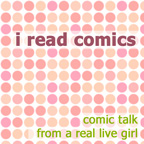Show #15 - Nov 19
 Show 15 on MP3
Show 15 on MP3
The Kuleshov Effect
Thoughts on Alan Moore's Top Ten (you can find Jess Nevins' annotations here)
An interview with the wonderful Brad Rader
Where you can find out about TEX!
Mofo Voltron and David Rees' Get Your War On!
We end with some uplifting music from William Shatner and Buzz Lightyear
Music, as always, by Mayerson.
Other music I listened to this week that I love: Finn Brothers, Finn
A proud member of the Comics Podcasts Network!
This podcast is sponsored by the Lincoln Heights Literary Society - Ontology On the Go!
TEX! Look at his package!


 I Read Comics Feed
I Read Comics Feed
 LiveJournal syndication
LiveJournal syndication Yahoo directory
Yahoo directory

3 Comments:
Hey LT, just saw this podcast and thought of you. http://www.justusboys.com/radio/index.html
if it changes before you get a chance to listen to it, Episode 6 is about gay comics, haven't listened to it yet myself.
By Anonymous, at 7:52 PM
Anonymous, at 7:52 PM
Wonderful interview, Lene!
Cheers,
Glen Glen
By Blogger, at 8:18 PM
Blogger, at 8:18 PM
I haven't read Top Ten, but from hearing your description, I think it's kind of interesting to have had these two "good guy" characters that busted a ring of pedophiles, to in the end possibly be (or have come from) a similar boat. Now I'm not saying that pedophilia is anything other than evil, but from a story point of view it's interesting to try and set up a comforting perspective (the super heroes) and to then pull the rug out from under the audience by having them be guilty of a similar incident as the people they busted.
It reminds me a lot of reading comics (like the Punisher) and from watching TV shows like Law and Order, where I find myself as a reader/viewer identifying with the "good guys" because the book and shows are written from a perspective where obviously they are right and the bad guys are wrong. Why is the defendant always guilty (well 99% of the time) on Law and Order? Because main characters can't be too flawed or bad, it’s just too uncomfortable for the audience and presents a point of view that can’t be trusted, which is a hard thing to pull off in fiction (e.g. Fight Club.)
Now, I don't know how I feel about springing this on an audience at the last moment like it sounds Moore did, but I find it interesting that the reader is forced (if they enjoyed what the read up until then) to challenge the way that they think about it when they're forced to see it from a different light.
I do think it's unfortunate that he (possibly, what the hell do I know) chose to do this with a gay couple which doesn't help the stupid stereotype that gay=pedophile.
I don't know. Also you say that the "...difference is because I loved you..." is Moore’s answer to the questions he brought up, but maybe it's not, maybe it's just an "in character" thing to say and there is no resolution, that the point of that whole thing is simply the bazillion questions the story raises. This is probably going to be a horrible example, so I apologize in advance for it, but it's like the film, Donnie Darko. The director/writer of that flick has stated that he's even not sure what the movie means or signifies beyond the questions that it raises (if you haven't seen it it's like some big loop of a story, much like a David Lynch film with no resolution.)
Also, once again, sorry that I'm bringing up old arguments, but I'm slowly working my way through your shows. I really do dig the podcast btw (no sarcasm, I really like the show.)
By Shawn Robare, at 12:46 PM
Shawn Robare, at 12:46 PM
Post a Comment
<< Home